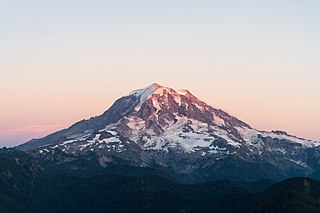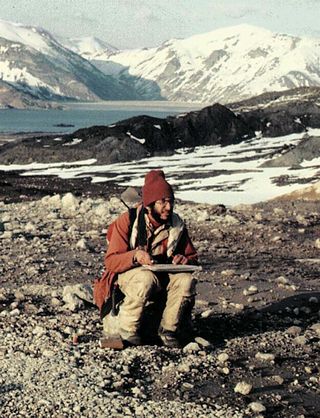
A volcano is a rupture in the crust of a planetary-mass object, such as Earth, that allows hot lava, volcanic ash, and gases to escape from a magma chamber below the surface. The process that forms volcanoes is called volcanism.

A stratovolcano, also known as a composite volcano, is a conical volcano built up by many alternating layers (strata) of hardened lava and tephra. Unlike shield volcanoes, stratovolcanoes are characterized by a steep profile with a summit crater and explosive eruptions. Some have collapsed summit craters called calderas. The lava flowing from stratovolcanoes typically cools and solidifies before spreading far, due to high viscosity. The magma forming this lava is often felsic, having high to intermediate levels of silica, with lesser amounts of less viscous mafic magma. Extensive felsic lava flows are uncommon, but can travel as far as 8km (5mi).

Volcanology is the study of volcanoes, lava, magma and related geological, geophysical and geochemical phenomena (volcanism). The term volcanology is derived from the Latin word vulcan. Vulcan was the ancient Roman god of fire.
A volcano observatory is an institution that conducts research and monitoring of a volcano.

Catherine Joséphine "Katia" Krafft and her husband, Maurice Paul Krafft were French volcanologists and filmmakers who died in a pyroclastic flow on Mount Unzen, Nagasaki, Japan, on 3 June 1991. The Kraffts became well known as pioneers in the filming, photographing, and recording of volcanoes, often coming within feet of lava flows. Their obituary appeared in the Bulletin of Volcanology. Since their deaths, their work has been featured in two documentary films by Werner Herzog, Into the Inferno (2016) and The Fire Within: A Requiem for Katia and Maurice Krafft (2022), and a further film, Fire of Love (2022), depicted their lives, relationship and careers using their archived footage.

David Alexander Johnston was an American United States Geological Survey (USGS) volcanologist who was killed by the 1980 eruption of Mount St. Helens in the U.S. state of Washington. A principal scientist on the USGS monitoring team, Johnston was killed in the eruption while manning an observation post six miles (10 km) away on the morning of May 18, 1980. He was the first to report the eruption, transmitting "Vancouver! Vancouver! This is it!" before he was swept away by a lateral blast; despite a thorough search, Johnston's body was never found, but state highway workers discovered remnants of his USGS trailer in 1993.

Harry Glicken was an American volcanologist. He researched Mount St. Helens in the United States before and after its 1980 eruption, and was very distraught about the death of volcanologist David A. Johnston, who was Glicken's mentor and supervisor in Spring 1980 at Mount St. Helens. Glicken was initially assigned to the USGS observation post in the weeks leading up to the eruption but was called away the night before the eruption.
The Decade Volcanoes are 16 volcanoes identified by the International Association of Volcanology and Chemistry of the Earth's Interior (IAVCEI) as being worthy of particular study in light of their history of large, destructive eruptions and proximity to densely populated areas. The Decade Volcanoes project encourages studies and public-awareness activities at these volcanoes, with the aim of achieving a better understanding of the volcanoes and the dangers they present, and thus being able to reduce the severity of natural disasters.
Christopher G. Newhall is a volcanologist, formerly with the U.S. Geological Survey and the Earth Observatory of SingaporeArchived 2011-11-30 at the Wayback Machine. He is the co-creator of the Volcanic explosivity index and specializes in volcanic prediction.
Jonathan David Blundy FRS is Royal Society Research Professor at the School of Earth Sciences at the University of Oxford and honorary professor at the University of Bristol.

Barry Voight is an American geologist, volcanologist, author, and engineer. After earning his Ph.D. at Columbia University, Voight worked as a professor of geology at several universities, including Pennsylvania State University, where he taught from 1964 until his retirement in 2005. He remains an emeritus professor there and still conducts research, focusing on rock mechanics, plate tectonics, disaster prevention, and geotechnical engineering.

Katharine Venable Cashman is an American volcanologist, professor of volcanology at the University of Bristol and former Philip H. Knight Professor of Natural Science at the University of Oregon.
Marie Edmonds is a Professor of volcanology and Earth Sciences at the Department of Earth Sciences at the University of Cambridge whose research focuses on the physics and chemistry of volcanic eruptions and magmatism and understanding volatile cycling in the solid Earth as mediated by plate tectonics. She is interested in the social and economic impacts of natural hazards; and the sustainable use of Earth's mineral and energy resources. Professor Edmonds is the Vice President and Ron Oxburgh Fellow in Earth Sciences at Queens' College, Cambridge. In 2024 she became Head of the Department of Earth Sciences, University of Cambridge, having previously been Deputy Head of Department and Director of Research for that Department.

Janine Krippner is a physical volcanologist from New Zealand who uses remote sensing to study pyroclastic flows and is a popular science communicator.
Jenni Barclay is a professor of volcanology at the University of East Anglia. She works on ways to mitigate volcanic risks, the interactions between rainfall and volcanic activity and the communication of volcanic hazards in the Caribbean. Barclay leads the NERC-ESRC funded Strengthening Resilience to Volcanic Hazards (STREVA) research project as well as a Leverhulme Trust programme looking at the volcanic history of the Ascension Islands.

Christina A. Neal is an American volcanologist and an honoree for a Samuel J. Heyman Service to America Medal. Neal was the Scientist-in-Charge at the Hawaiian Volcano Observatory from 2015 to 2020. Neal took over as the director of the U.S. Geological Survey (USGS) Volcano Science Center on May 9, 2021. Neal is a Fellow of the Geological Society of America.
Susan Loughlin MBE is a British volcanologist. She was Director of the Montserrat Volcano Observatory from 2004-2006, and has been Head of Volcanology for the British Geological Survey since 2008.

Michelle Lynn Coombs is a geologist at the Alaska Volcano Observatory (AVO). She was the Scientist-in-Charge from 2016 to 2023. Coombs is a fellow of the Geological Society of America.
Shanaka L de Silva is a British-American geologist, academic and author. He is Sri Lankan by birth but grew up in England where he completed his education. He then moved to the US where he is a professor of geology and geophysics at Oregon State University.












